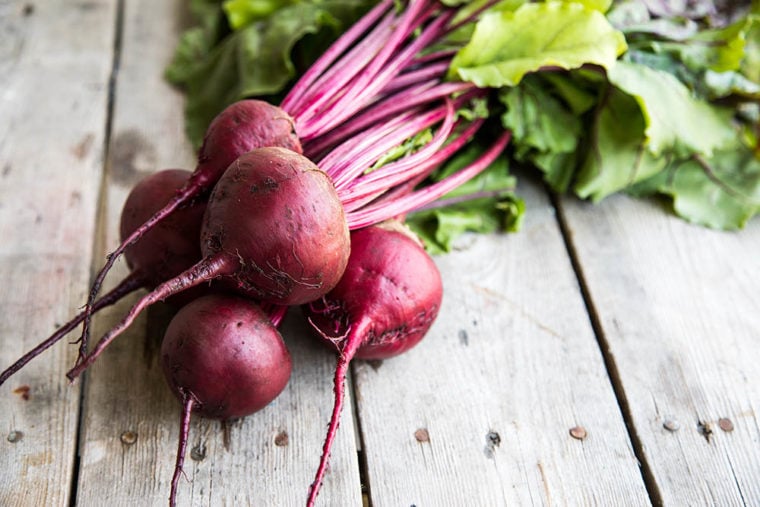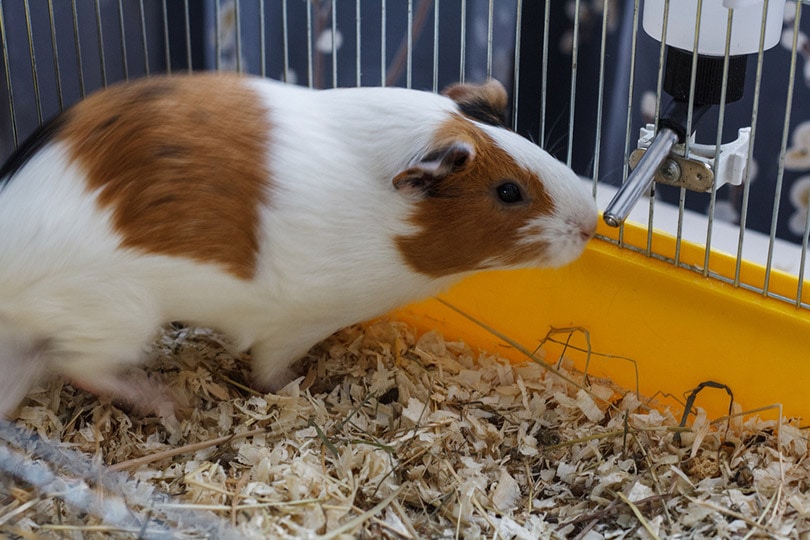
Click to Skip Ahead
If you are fortunate enough to count guinea pigs among your pets, you know that one of the most important aspects of cavy care is providing them with the right diet. Many people rely on commercial guinea pig foods, and these can be a good way to supplement your pet’s diet, but guinea pigs thrive on variety.
Providing the right mix of hay, vegetables, fruits and pellets is essential for happy healthy piggies, but it’s not always easy to know how much to give of each, and which fruits and vegetables are safe. So if you’ve ever asked the question, Can Guinea Pigs Eat Beets? you’ve come to the right place.
Yes, guinea pigs can eat beets, BUT we need to be careful not to feed them too much.
Let’s take a look at the pros and cons of beets for guinea pigs, and which foods are better alternatives.
Are Beets Safe for Guinea Pigs?
If you are using beets in a recipe and want to offer a taste to your guinea pig, it is perfectly safe to do so. In fact, in moderation, beets, and more specifically, beet greens, can provide some essential nutrients, namely, Vitamin C.

Vitamin C
Although we don’t have a lot in common with these four-legged herbivores, one trait that we humans do share with guinea pigs is that we cannot synthesize our own Vitamin C, meaning, we need to acquire it from our food. Vitamin C deficiency, also known as scurvy, affects the connective tissue in the body, leading to arthritis, skin ulceration, non-healing wounds, and dental problems. If not corrected quickly, scurvy can lead to bloating and constipation from gut stasis in guinea pigs, which can be fatal.
Although most guinea pig commercial foods contain vitamin C, the amounts are usually not enough to meet the needs of your pet, so other foods must be used to ensure your cavy is getting enough of this essential vitamin. The average 1kg (2.2 lb) guinea pig needs approximately 10-30 mg of vitamin C per day. In 100g of beet root, there is only 4.9mg of vitamin C, but 100g of beet greens has 30mg! We wouldn’t recommend feeding your guinea pig 100g of beet greens, but you get the idea.
The Nutritional Value of Beets
The table below shows a summary of the key nutrients found in beet greens and the beet root.
| Beet greens 100g
|
Beet root 100g
|
|
| Water | 91 g | 87.6 g |
| Energy | 22 kcal | 43 kcal |
| Protein | 2.2 g | 1.61 g |
| Fat | 0.13 g | 0.17 g |
| Fiber | 3.7 g | 2.8 g |
| Sugar | 0.5 g | 6.76 g |
| Calcium | 117 mg | 16 mg |
| Phosphorus | 41 mg | 40 mg |
| Iron | 2.57 mg | 0.8 mg |
| Magnesium | 70 mg | 23 mg |
| Potassium | 762 mg | 325 mg |
| Sodium | 226 mg | 78 mg |
| Vitamin C | 30 mg | 4.9 mg |
The Problem With Beets
There are two main issues when it comes to feeding beets to your guinea pig: the calcium & phosphorus content, and the high levels of oxalic acid (oxalates).
Calcium & Phosphorus
Due to the interaction between calcium (Ca) and phosphorus (P), each animal species has an ideal proportion in which these two minerals should be consumed. For guinea pigs, that ratio should be around 1.3 – 1.6 Ca to 1.0 P. Beet greens have a Ca:P ratio of 3:1, whereas the beet root’s ratio is 1:2.5.
When calcium exceeds phosphorus by too much, it can lead to calcium deposits forming in different parts of the body, most significantly, in the kidneys. When there is significantly more phosphorus than calcium, this leads to calcium deficiency. Neither the greens or the root of beets are in the Ca:P sweet spot.

Oxalic Acid
Foods high in oxalates can lead to the formation of kidney stones, and, you guessed it, beets are high in oxalates. In fact, they are on the list of foods to be avoided by people with kidney disease.
In a species already predisposed to kidney and bladder stones, you can see why we need to be careful when offering beets to our guinea pigs.
Benefits of Beets for Guinea Pigs
As we discussed earlier, one of the primary benefits of feeding beet greens to guinea pigs is the vitamin C content. However, there are many other options that are high in vitamin C, without the high oxalates and calcium content.
Another potential benefit of beets, particularly in the root, is found in a type of antioxidant called betalains, which are responsible for the bright red color of the root and stem. There is increasing interest in the role of antioxidants, particularly those with pink or purple pigmentation, in human health. There is increasing evidence that antioxidants like betalains may play a role in reducing inflammation and preventing cancer. However, these benefits have not been proven, and their significance for our cavy friends are likely to be minimal at best.

Should I Feed My Guinea Pigs Beets?
The problems we discussed with feeding beets to your guinea pig do not mean that they shouldn’t have them at all. When compared to a lot of other vegetables, they are a relatively safe option, and a leaf here or a slice there certainly won’t do any harm. If you are looking for ways to add a little bit of color and variety into your cavy’s food bowl, beets are something you can offer them a few times a month, but we wouldn’t suggest placing them high on your guinea pig’s regular menu.
For the average adult guinea pig, 1-2 beet leaves, or 1-2 slices (approx 1 inch diameter) would be a safe amount. Always offer fresh, washed, raw vegetables. Cooking depletes the nutritional value, and pickled vegetables can cause tummy upsets, or even be toxic.
If your guinea pig has a history or kidney or bladder stones, beets are best avoided.
Instead, check out these vegetable alternatives, which provide plenty of vitamin C, with more favorable Ca:P ratios, and lower oxalate levels:
What Should I Feed My Guinea Pig?
The optimal guinea pig diet should consist of approximately:
All guinea pigs should have ready access to clean, fresh water. This should be provided with both a bottle dispenser and a bowl.
Another important factor in your guinea pig’s health is vitamin D. Also known as calciferol, vitamin D is essential for many bodily processes, and is particularly important for ensuring the correct absorption of a number of minerals, specifically calcium and phosphorus. The best (and easiest) way to ensure your guinea pig gets their dose of vitamin D is to make sure they get to spend some quality time in the sunshine, being careful to protect them from heat, direct sunlight, and predators. In some cases, particularly in places where sunlight is limited during the winter months, Vitamin D supplementation might be needed, but talk to your vet before adding any supplements to your pet’s diet.

What Foods Are Unsafe For Guinea Pigs?
Some of these foods are toxic, while others risk causing gastrointestinal problems.
Conclusion
Beets are a safe food to offer your pet guinea pig, but due to their high oxalate levels and unfavorable levels of calcium and phosphorus, they should not form part of their regular diet. Offering your cavy a variety of different vegetable options is a great way to provide them with enrichment, as well as ensure you are meeting their nutritional needs, and beets can be a part of that variety.
If you are unsure of which foods you should be feeding your guinea pig, or whether they are getting everything they need from their diet, a health check with your cavy savvy vet is always a good idea.
Featured Image Credit: Ivanna Pavliuk, Shutterstock









